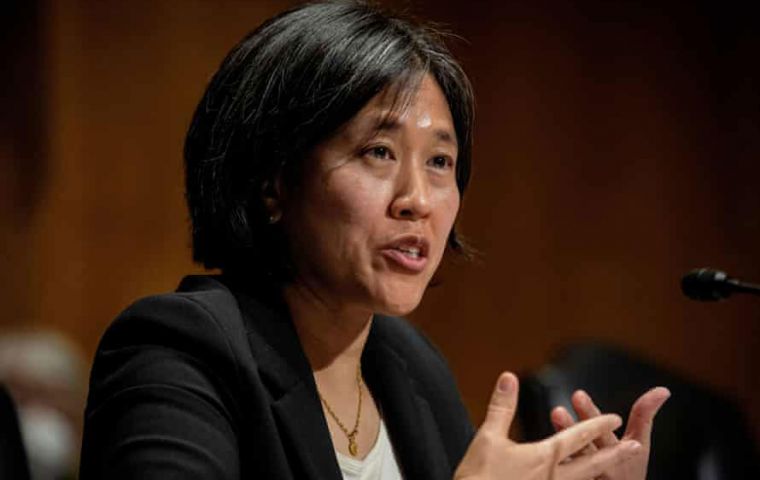MercoPress. South Atlantic News Agency
United States in favor of waiving covid-19 vaccine patents
 Trade Representative Katherine Tai made the announcement.
Trade Representative Katherine Tai made the announcement. United States President Joseph Biden has made it clear that after weighing all the pros and cons he was in favor of waiving intellectual property rights on anticovid-19 vaccine patents so that they can be produced faster and the world can finally overcome the current pandemic.
Trade Representative Katherine Tai made the announcement. “This is a global health crisis, and the extraordinary circumstances of the covid-19 pandemic call for extraordinary measures,” she said in a statement.
“The administration believes strongly in intellectual property protections, but in service of ending this pandemic, supports the waiver of those protections for COVID-19 vaccines. We will actively participate in text-based negotiations at the World Trade Organization needed to make that happen,” she added.
Tai explained that the administration's goal was “to get as many safe and effective vaccines to as many people as fast as possible,” and to help expand vaccine manufacturing and distribution.
World Health Organization head Tedros Adhanom Ghebreyesus praised Biden's endorsement to lift the proprietary limits on coronavirus vaccines. “This is a monumental moment in the fight against #COVID19,” he said on Twitter. “The commitment by @POTUS Joe Biden & @USTradeRep @AmbassadorTai to support the waiver of IP protections on vaccines is a powerful example of leadership to address global health challenges.”
The announcement now allows for negotiations to begin at the World Trade Organization (WTO) where proposals in that regard had already been filed. The consequences of not passing the waiver are “staggering,” Mustaqeem de Gama, South Africa's World Trade Organization counselor was quoted as saying, “not only on the level of the loss of human lives, but also on the economic level.” He added that “we believe that intellectual property rights constitute a very substantial barrier to ensure equitable access” and “if we could have a limited, targeted waiver to ensure that we can ramp up production in various parts of the world, we would go a long way to ensure that we address not only the prevention, but also the treatment of covid-19.”
Pharmaceutical companies like Pfizer, Moderna and Johnson & Johnson, may be affected by Biden's decision. The Pharmaceutical Research and Manufacturers of America, a drug industry trade group, argued that the move represents a break in longstanding U.S. policy over medical patents amid global inequities and will compromise U.S. job creation and the country's future place as a leader in biomedical innovation..
“In the midst of a deadly pandemic, the Biden Administration has taken an unprecedented step that will undermine our global response to the pandemic and compromise safety,” PhRMA said. “This decision will sow confusion between public and private partners, further weaken already strained supply chains and foster the proliferation of counterfeit vaccines,” a statement from the trade group went on.
Prior to Wednesday's announcement, the US was among several other wealthy nations — including the United Kingdom, Canada and Japan — who resisted WTO negotiations about the proposal.
The battle mirrors another during the HIV/AIDS epidemic in the 1990s, when drug companies warred with global health officials who sought to produce generic treatments. Drugmakers eventually retreated after former South African president Nelson Mandela accused the companies of using patents to profit from his country's health crisis. The HIV crisis gave way to a precedent in relaxing patent restrictions: In 2001, WTO added the Doha Declaration to its Trade-Related Aspects of Intellectual Property Rights (TRIPS) agreement to allow low-income nations to import and develop generic versions of patented medicines.
Biden has been under immense pressure to waive vaccine patents, one of his campaign promises. But Wednesday's announcement is just a first step in a long chain of events that will likely ensue. The WTO is a consensus-based organization and cannot move forward unless the European Union, which is against the waiver, and everyone else agrees.
If that consensus is reached, countries must start text-based negotiations at the WTO, going through each item of the complex and multilayered IP legal requirements — a process that could take months, or even years. “I'm not going to put odds on how likely it is to find an agreement,” said WTO spokesman Keith Rockwell, summarizing the WTO closed-door General Council meeting on the TRIPS waiver Wednesday. But he admitted there was a common view on the need for wider access to vaccines and treatments. But vaccines are complex in terms of IPs involving their ingredients and manufacturing processes so, in practice, the granting of waivers is far more complicated than it would seem.
“The waiver is just one tool and does not offer a blanket solution, said Yuanqiong Hu,” a senior legal and policy adviser with Doctors Without Borders, one of the organizations that support the TRIPS waiver.
Opposing the TRIPS waivers are Pfizer and Moderna as well as Microsoft co-founder Bill Gates, whose Bill and Melinda Gates Foundation sponsored Gavi, the Vaccine Alliance — the driving force behind COVAX, the U.N. mechanism to improve low — and middle-income countries' access to vaccines. Despite more than two decades of philanthropic work to immunize the world's poor, Gates is a fierce defender of IP protection.
The Biden administration said it would continue to ramp up efforts, working with the private sector and all possible partners to expand vaccine manufacturing and distribution, and increase the raw materials needed to produce the vaccines.




Top Comments
Disclaimer & comment rulesCommenting for this story is now closed.
If you have a Facebook account, become a fan and comment on our Facebook Page!